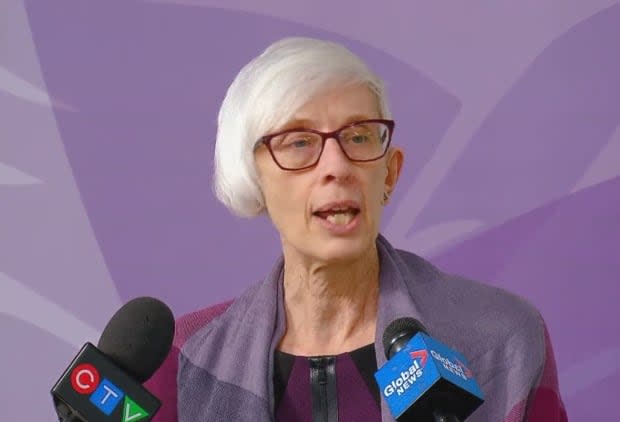Alberta government says it has tackled backlog of Clare's Law applications

Albertans concerned that their intimate partners could have a violent past were sometimes waiting more than three months for information from a government threat assessment centre.
On Thursday, Justice Minister Tyler Shandro said the justice ministry has cleared a backlog of about 180 applications under Clare's Law by assigning more staff to the centre.
"We heard loud and clear from most of the people who were applying, that they just wanted to know: am I at risk," Shandro said in an interview.
The United Conservative Party government enacted Clare's Law on April 1, 2021.
Clare's Law originated in the U.K. in 2014 and is named for Clare Wood, a woman killed by her ex-boyfriend. She was unaware of his violent past.
The law is an additional tool to help curb domestic violence by giving citizens a way to ask for information about their intimate partner's criminal history without the partner knowing.
Police can and have also used the law to proactively tell someone their intimate partner may pose a risk.
Saskatchewan and Alberta are the only Canadian jurisdictions with such a law. Other provinces and territories have also explored the idea, and are watching the Prairie provinces with interest.
When CBC News asked Alberta Justice for data in January on how many people had requested — and received — information through the Clare's Law application process, the government said 159 of the 372 applicants at the time had received information, which calculates to 42 per cent.
Now, a much larger proportion of applicants have received information.
Shandro's press secretary, Joseph Dow, said the program has received 440 applications since it began, and police have handed information to 320 people, or, nearly 75 per cent of the applicants.
Police agencies are in the process of relaying information to another 80 people, Dow said.
The government's Integrated Threat and Risk Assessment Centre (ITRAC) is responsible for reviewing the applications and providing information to local police, who then meet with applicants if their partner poses a moderate or high risk of violence.
The government said it aimed to compile the information for each case within four weeks of receiving an application.
Shandro acknowledged on Thursday that ITRAC had a backlog so substantial, workers were triaging cases by severity. That meant some applications went untouched for months before law enforcement experts began searching for information.
Some, but not all, of the disclosures include information about past criminal convictions, Shandro said.
Albertans waiting three or four months to get information from a Clare's Law application wasn't news to Jan Reimer, executive director of the Alberta Council of Women's Shelters.
She said shelter workers that have been helping clients with their applications, or filing them on their behalf, have seen the delays.
Reimer said people who are afraid of their partner should seek help immediately, before waiting for that additional information.
"If you feel you're at risk, if you're uncertain, reach out," Reimer said. "Get the help that you need, and the support. And you shouldn't be waiting days, let alone weeks. You need to take action if you're feeling unsafe."
Other barriers to information
Reimer and other advocates have also flagged hurdles that prevent some vulnerable people from filing Clare's Law applications, or receiving information about their partners.
Previously, a person who wanted information about their intimate partner had to meet with a police officer in person, and could only receive that information verbally. Shandro said Thursday this is no longer the case, and people could receive the information online.

Reimer said that development is a welcome change.
However, applicants still do have to sign a confidentiality agreement to receive information about their partner's criminal past.
Reimer said that doesn't make much sense, given most of that information is publicly available from courthouses.
"It's a huge barrier," she said. "How you tell your friends, your family … or the agencies that you approach, it would be helpful for them to know this as part of their safety planning with you."
Reimer said women who fear domestic violence should also be able to get the information handed over by non-police workers. She said Indigenous women, or those with outstanding warrants for minor crimes, may distrust police or refuse to meet with officers.
Shandro said the government has to be "careful" that it discloses any information about criminal records in the context of the risk the person could pose to a partner. He said he welcomed the feedback from the council of women's shelters.


